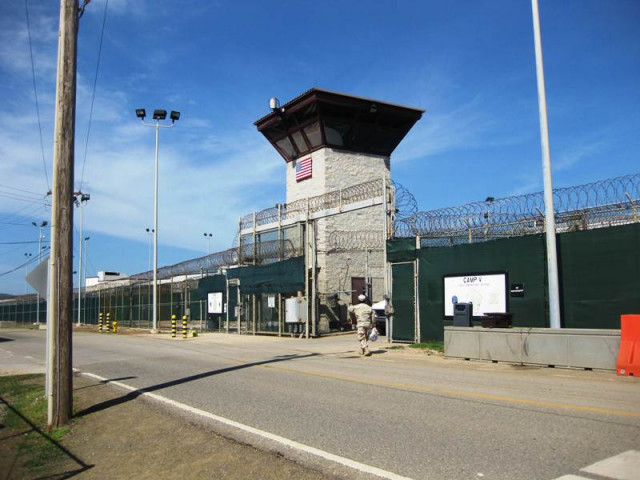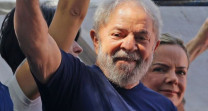Obama vows new bid to close Gitmo ‘no man’s land’
"It is expensive. It is inefficient. It hurts us in terms of our international standing," says Obama.

File photo of Guantanamo Bay. PHOTO: AFP
Condemning the prison as a legal "no man's land," Obama told a White House news conference that it was time Congress agreed to shut the jail and said the military was trying to keep detainees alive in the face of the hunger strike.
"I continue to believe we have to close Guantanamo. I think it is critical for us to understand that Guantanamo is not necessary to keep America safe," he told reporters.
"It is expensive. It is inefficient. It hurts us in terms of our international standing. It lessens cooperation with our allies on counterterrorism efforts. It is a recruiting tool for extremists.
"It needs to be closed," he said.
The tough words were the most extensive the president has delivered on Guantanamo for months and reflected his frustration with Congress, which he blamed for blocking his efforts to shut the jail during his first term.
A spreading hunger strike among inmates, who are protesting their indefinite detention without charges or trials, has put Guantanamo back in the headlines and placed Obama in a difficult position.
The US president said it was "not a surprise to me" that there were "problems" at Guantanamo.
Out of 166 inmates held at the remote US naval base in southeastern Cuba, 100 are now on hunger strike, according to the latest tally from the Pentagon. Of those, 21 detainees are being fed through nasal tubes.
The military has sent extra medical staff to cope with the hunger strike, which is entering its 12th week.
"I don't want these individuals to die," Obama said.
"Obviously, the Pentagon is trying to manage the situation as best as they can, but I think all of us should reflect on why exactly are we doing this."
Earlier this month, prison guards clashed with inmates after moving detainees out of communal cell blocks because they had covered surveillance cameras.
Obama has long argued for prosecuting enemy combatants in civilian courts and transferring those cleared of wrongdoing to their home countries.
As a candidate in 2008, Obama pledged to close the jail and announced plans to close Guantanamo immediately after entering office in 2009.
But a majority of lawmakers, particularly Republicans, have insisted that the jail stay open, that the detainees are too dangerous to be held on the US mainland and that suspects should only be tried before military tribunals.
"The President faces bipartisan opposition to closing Guantanamo Bay's detention centre because he has offered no alternative plan regarding the detainees there, nor a plan for future terrorist captures," Buck McKeon, the Republican chairman of the House Armed Services Committee, said in a statement.
Obama said he would try again to persuade Congress to find a way to close Guantanamo, which was set up by his predecessor, George W. Bush, to hold those captured in Afghanistan and elsewhere after the attacks of September 11, 2001.
"I'm going to reengage with Congress to try to make the case that this is not something that's in the best interest of the American people. And it is not sustainable."
Obama warned the situation would only get worse and said it made no sense to hold inmates in a "no man's land" indefinitely – even after the withdrawal of US forces from Iraq and soon from Afghanistan.
It is "contrary to who we are and our interests and it needs to stop," Obama said.
Rights groups, which have long branded the prison as a legal "black hole," welcomed Obama's remarks but said he could do more.
"President Obama's call to end indefinite detention at Guantanamo is encouraging after his long silence on the issue," said Laura Pitter, counterterrorism advisor at Human Rights Watch.
"Though he blamed Congress for the problems at Guantanamo, there are actions he could have taken and can still take now to end indefinite detention there."
The American Civil Liberties Union said Obama could use his authority now to transfer more than half the inmates out of Guantanamo.



















COMMENTS
Comments are moderated and generally will be posted if they are on-topic and not abusive.
For more information, please see our Comments FAQ